 полная версия
полная версияThe Classic Myths in English Literature and in Art (2nd ed.) (1911)
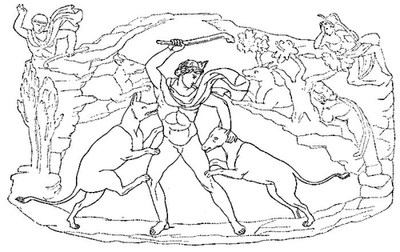
Fig. 71. Actæon
One day, having repaired to a valley inclosed by cypresses and pines, where gushed a fountain of sparkling water, the chaste Diana handed her javelin, her quiver, and her bow to one nymph, her robe to another, while a third unbound the sandals from her feet. Then Crocale, the most skillful of them, arranged her hair, and Nephele, Hyale, and the rest drew water in capacious urns. While the huntress queen was thus employed in the labors of the toilet, Actæon, the son of Autonoë and Aristæus, having quitted his companions of the chase and rambling without any especial object, came to the place, led thither by his destiny. As he presented himself at the entrance of the cave, the nymphs, seeing a man, screamed and rushed towards the goddess to hide her with their bodies. But she was taller than the rest and overtopped them all by a head. Such a color as tinges the clouds at sunset or at dawn came over the countenance of Diana, thus taken by surprise. Surrounded as she was by her nymphs, she yet turned half away and sought with a sudden impulse for her arrows. As they were not at hand, she dashed the water into the face of the intruder, saying, "Now go and tell, if you can, that you have seen Diana unappareled." Immediately a pair of branching stag's horns grew out of the huntsman's head, his neck gained in length, his ears grew sharp-pointed, his hands became feet, his arms, his long legs, and his body were covered with a hairy spotted hide. Fear took the place of his former boldness, and the hero fled. What should he do? – go home to the palace or lie hid in the woods? While he hesitated his dogs saw him. Over rocks and cliffs, through mountain gorges that seemed impracticable, he fled, and they followed. The air resounded with the bark of the dogs. Presently one fastened on his back, another seized his shoulder; the rest of the pack came up and buried their teeth in his flesh. His friends and fellow-huntsmen cheered on the dogs, and, looking everywhere for Actæon, called on him to join the sport. At the sound of his name, he turned his head and heard them regret that he should be away. He earnestly wished he was. But Diana had no pity for him, nor was her anger appeased till the dogs had torn his life out.
96. The Fortunes and Death of Orion. Orion, the son of Neptune, was a giant and a mighty hunter, whose prowess and manly favor gained for him the rare good will of Diana.
It is related that he loved Merope, the daughter of Œnopion, king of Chios, and sought her in marriage. He cleared the island of wild beasts and brought the spoils of the chase as presents to his beloved; but as Œnopion constantly deferred his consent, Orion attempted to gain possession of the maiden by violence. Her father, incensed at his conduct, made Orion drunk, deprived him of his sight, and cast him out on the seashore. The blinded hero, instructed by an oracle to seek the rays of morning, followed the sound of a Cyclops' hammer till he reached Lemnos, where Vulcan, taking pity on him, gave him Cedalion, one of his men, to be his guide to the abode of the sun. Placing Cedalion on his shoulders, Orion proceeded to the east, and there meeting the sun-god, was restored to sight by his beam.118
After this he dwelt as a hunter with the queen of the echoing chase; and it was even hinted that she loved him. Her brother, highly displeased, often chid her, but to no purpose. One day, therefore, observing Orion as he waded through the sea with his head just above the water, Apollo pointed out the black object to his sister, and maintained that she could not hit it. The archer goddess discharged a shaft with fatal aim: the waves rolled the dead body of Orion to the land. Then bewailing her fatal error with many tears, Diana placed him among the stars, where he appears as a giant, with a girdle, sword, lion's skin, and club.
Sirius, his dog, follows him, and the Pleiads fly before him.119 In the beginning of winter, all through the night, Orion follows the chase across the heavens; but with dawn he sinks toward the waters of his father Neptune. In the beginning of summer, he may be seen with daybreak in the eastern sky, where, beloved by Aurora, he remains gradually paling before the light of day till, finally, Diana, jealous of his happiness, draws her gentle darts and slays him.
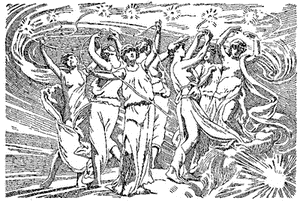
Fig. 72. The Pleiades
From the painting by Vedder
97. The Pleiads,120 who still fly before Orion in the heavens, were daughters of Atlas, and nymphs of Diana's train. One day Orion saw them in Bœotia, became enamored of them, and gave pursuit. In their distress they prayed to the gods to change their form. Jupiter, accordingly, turned them into pigeons, and made them a constellation. Though their number was seven, only six stars are visible; for Electra, it is said, left her place that she might not behold the ruin of Troy, which had been founded by her son Dardanus. The sight had such an effect on her sisters that they blanched, and have been pale ever since. But Electra became a comet; her hair floating wildly behind her, she still inconsolably ranges the expanse of heaven. According to some, the lost Pleiad is Merope, who was vested with mortality in consequence of her marriage with the mortal Sisyphus, king of Corinth.
Tennyson's reference to the Pleiads, in "Locksley Hall," is of course familiar to all readers.
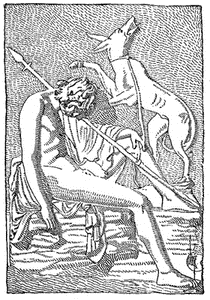
Fig. 73. Endymion
98. Endymion. The frequent absence of Diana from her duties in heaven is said to have awakened suspicion among the deities of Olympus, who doubted whether she actually occupied these intervals with hunting. It is easy to imagine the satisfaction with which Venus, who so often had been reproached by Diana with her undue fondness of beautiful youths, would welcome news of a corresponding weakness on the part of the cold-hearted and apparently unyielding huntress queen. And such satisfaction Venus once enjoyed, if we may trust the later classical and the modern poets who have identified Diana with Selene, the more ancient goddess of the moon.
For, one calm, clear night Selene looked down upon the beautiful Endymion, who fed his flock on Mount Latmos, and saw him sleeping. The heart of the goddess was unquestionably warmed by his surpassing beauty. She came down to him; she kissed him; she watched over him while he slept. She visited him again and again. But her secret could not long be hidden from the company of Olympus. For more and more frequently she was absent from her station in the sky, and toward morning she was ever paler and more weary with her watching. When, finally, her love was discovered, Jupiter gave Endymion, who had been thus honored, a choice between death in any manner that was preferable, or perpetual youth united with perpetual sleep. Endymion chose the latter. He still sleeps in his Carian cave, and still the mistress of the moon slips from her nocturnal course to visit him. She takes care, too, that his fortunes shall not suffer by his inactive life: she yields his flock increase, and guards his sheep and lambs from beasts of prey.121
Keats, whose Endymion journeys on a mission under sea, thus describes a meeting of the goddess and her lover:
On gold sand impearledWith lily shells and pebbles milky white,Poor Cynthia greeted him, and soothed her lightAgainst his pallid face: he felt the charmTo breathlessness, and suddenly a warmOf his heart's blood: 'twas very sweet; he stayedHis wandering steps, and half-entrancèd laidHis head upon a tuft of straggling weeds,To taste the gentle moon, and freshening beads,Lashed from the crystal roof by fishes' tails.And so he kept, until the rosy veils,Mantling the east, by Aurora's peering handWere lifted from the water's breast, and fannedInto sweet air; and sobered morning cameMeekly through billows: – when like taper-flameLeft sudden by a dallying breath of air,He rose in silence, and once more 'gan fareAlong his fated way.12299. Myths of Venus. Round the goddess of love cluster romances of her own tender passion, of the affairs of the winged Cupid, and of the loves of the worshipers at her shrine. Of the affection of Venus for Mars and of her relations with Anchises,123 the father of Æneas, mention is elsewhere made. The following is the myth of Venus and Adonis.
100. Adonis. 124 The sweetly smiling goddess, playing one day with her boy Cupid, wounded her bosom with one of his arrows. Before the wound healed, she looked upon Adonis, the son of Cinyras and Myrrha, and was captivated by him. She no longer took any interest in her favorite resorts, – Paphos, and Cnidos, and Amathus, rich in metals. She absented herself even from Olympus, for Adonis was dearer to her than heaven. Him she followed and bore him company. She who loved to recline in the shade, with no care but to cultivate her charms, now rambled through the woods and over the hills, girt like the huntress Diana. She chased game that is safe to hunt, but kept clear of the wolves and bears. She charged Adonis, too, to beware of dangerous animals. "Be brave toward the timid," she would say, "courage against the courageous is not safe." Having thus, on one occasion, warned him, she mounted her chariot drawn by swans and drove away through the air. But Adonis was too noble to heed such counsels. The dogs had roused a wild boar from his lair, and the youth threw his spear and wounded the animal with a sidelong stroke. The beast drew out the weapon with his jaws, and, rushing after Adonis, buried his tusks in the lad's side, and stretched him dying upon the plain. The rest of the story is thus recounted:
THE LAMENT FOR ADONIS 125… Low on the hills is lying the lovely Adonis, and his thigh with the boar's tusk, his white thigh with the boar's tusk, is wounded; and sorrow on Cypris he brings, as softly he breathes his life away.
His dark blood drips down his skin of snow; beneath his brows his eyes wax heavy and dim; and the rose flees from his lip, and thereon the very kiss is dying, the kiss that Cypris will never forego.
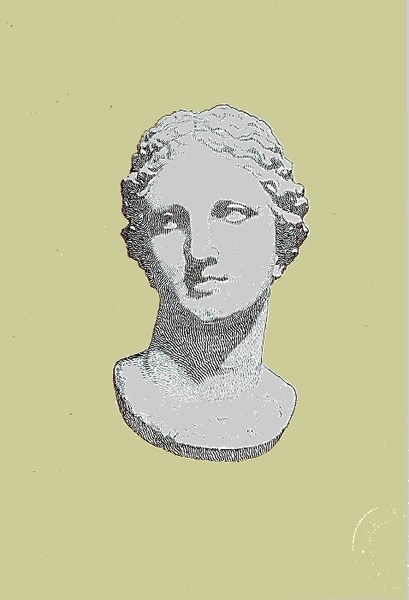
PETWORTH APHRODITE
… She hath lost her lovely lord, with him she hath lost her sacred beauty. Fair was the form of Cypris while Adonis was living, but her beauty has died with Adonis! Woe, woe for Cypris, the mountains all are saying. And the oak trees answer, Woe for Adonis! And the rivers bewail the sorrows of Aphrodite, and the wells are weeping Adonis on the mountains. The flowers flush red for anguish, and Cytherea through all the mountain-knees, through every dell, doth shrill the piteous dirge:
Woe, woe for Cytherea, he hath perished, the lovely Adonis!
… When she saw, when she marked the unstanched wound of Adonis, when she saw the bright red blood about his languid thigh, she cast her arms abroad, and moaned, "Abide with me, Adonis, hapless Adonis, abide!.. Awake, Adonis, for a little while, and kiss me yet again, the latest kiss!.. This kiss will I treasure, even as thyself, Adonis, since, ah, ill-fated, thou art fleeing me, thou art fleeing far, Adonis, and art faring to Acheron, to that hateful king and cruel, while wretched I yet live, being a goddess, and may not follow thee! Persephone, take thou my lover, my lord, for thyself art stronger than I, and all lovely things drift down to thee. But I am ill-fated, inconsolable is my anguish; and I lament mine Adonis, dead to me, and I have no rest for sorrow.
"Thou diest, oh, thrice-desired, and my desire hath flown away as a dream! Nay, widowed is Cytherea, and idle are the Loves along the halls! With thee has the girdle of my beauty perished. For why, ah, overbold, didst thou follow the chase, and being so fair, why wert thou thus overhardy to fight with beasts?"
So Cypris bewailed her, the Loves join in the lament:
Woe, woe for Cytherea, he hath perished, the lovely Adonis!

Fig. 74. The Death of Adonis
A tear the Paphian sheds for each blood-drop of Adonis, and tears and blood on the earth are turned to flowers. The blood brings forth the rose; the tears, the wind-flower.
Woe, woe for Adonis, he hath perished, the lovely Adonis!
… Cease, Cytherea, from thy lamentations, to-day refrain from thy dirges. Thou must again bewail him, again must weep for him another year.
101. Cupid and Psyche. 126 A certain king and queen had three daughters. The charms of the two elder were more than common, but the beauty of the youngest was such that the poverty of language is unable to express its praise. In fact, Venus found her altars deserted, while men paid their vows to this virgin. When Psyche passed, the people sang her praises and strewed her way with chaplets and flowers.
This perversion of homage gave great offense to Venus, who complained that Paris might just as well not have yielded her the palm of beauty over Pallas and Juno, if a mortal were thus to usurp her honors. Wherefore she called Cupid and, pointing out Psyche to him, bade him infuse into the bosom of that haughty girl a passion for some low, unworthy being.
There were in Venus's garden two fountains, – one of sweet waters, the other of bitter. Cupid filled two amber vases, one from each fountain, and suspending them from the top of his quiver, hastened to the chamber of Psyche, whom he found asleep. He shed a few drops from the bitter fountain over her lips, though the sight of her almost moved him to pity; and then he touched her side with the point of his arrow. She awoke, and opening her eyes upon Cupid (himself invisible), so startled him that in his confusion he wounded himself with his arrow. Heedless of his wound, his thought now was to repair the mischief he had done. He poured, at once, the waters of joy over her silken ringlets.
But Psyche, henceforth frowned upon by Venus, derived no benefit from her charms. Her two elder sisters had long been married to princes; but Psyche's beauty failed to awaken love. Consequently her parents, afraid that they had unwittingly incurred the anger of the gods, consulted the oracle of Apollo.
They received answer, "The virgin is destined for the bride of no mortal lover. Her husband awaits her on the top of the mountain. He is a monster whom neither gods nor men can resist."
This dreadful decree of the oracle filled the people with dismay; but, at Psyche's request, preparations for her fate were made. The royal maid took her place in a procession, which more resembled a funeral than a nuptial pomp, and with her parents, amid the lamentations of their subjects, ascended the mountain, where she was left alone.
While Psyche stood there, panting with fear and with eyes full of tears, the gentle Zephyr lifted her and, with an easy motion, bore her to a flowery dale. By degrees her mind became composed, and she laid herself down on the grassy bank to sleep. When she awoke refreshed with sleep, she beheld near by a pleasant grove of tall and stately trees. Entering, she discovered in the midst a fountain, and fast by a palace whose august front showed that it was not the work of mortal hands, but the happy retreat of some god. She approached the building and entered. Every object she met filled her with pleasure and amazement. Golden pillars supported the vaulted roof, and the walls were enriched with carvings and paintings that represented beasts of the chase and rural scenes. Other apartments were filled with still other beautiful and precious productions of nature and art.
While her eyes were thus occupied, the voice of an invisible being addressed her: "Sovereign lady, all that thou beholdest is thine. We whose voices thou dost hear are thy servants. Retire, we pray thee, to thy chamber, repose on thy bed of down, and when it may please thee repair to the bath. Food awaits in the adjoining alcove."
After repose and the refreshment of the bath, Psyche seated herself in the alcove, where, without any visible aid, a table immediately presented itself, covered with delicacies and nectareous wines. Her ears, too, were delighted with music from invisible performers.
For a long time she did not see her husband. He came in the hours of darkness and fled before the dawn of morning; but his accents were full of love and inspired a like passion in her. Often she begged him to stay and let her behold him, but he would not consent. "Having looked upon me," he said, "mayhap thou wouldst fear, mayhap adore, me; but all I ask of thee is love. I would rather thou shouldst love me as an equal than adore me as a god." This reasoning somewhat quieted Psyche for a time. But the thought of her parents and of her sisters, left in ignorance of her fate, preyed on her mind to such a degree that at last, telling her distress to her lord, she drew from him an unwilling consent that her sisters should be brought to see her.
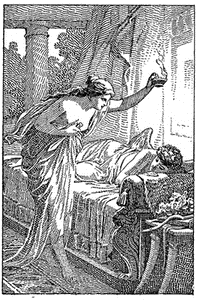
Fig. 75. Psyche at the Couch of Cupid
From the painting by Thumann
Zephyr, promptly obedient, soon brought them across the mountain down to their sister's valley. They embraced her. She returned their caresses, and then committed them to the care of her attendant voices, who should refresh them in her bath and at her table, and show them her treasures. The view of these delights caused envy to enter their bosoms. They plied their fortunate sister with questions about her husband. Psyche replied that he was a beautiful youth, who generally spent the daytime in hunting upon the mountains. The sisters, not satisfied with this reply, soon made her confess that she had never seen him. Then they proceeded to fill her bosom with dark suspicions. Probably her husband was a dreadful monster, such as the Pythian oracle had prophesied. Probably he was a direful serpent, who nourished her now to devour her by and by. They advised her to provide herself against the night with a lamp and a sharp knife, told her what to do if her husband turned out the monster that they surmised, and, so saying, departed.
These persuasions Psyche resisted as well as she could, but they did not fail to have their effect on her mind. She prepared a lamp and a sharp knife, and hid them out of sight of her husband. That night, when he had fallen into his first sleep, she silently rose and uncovering her lamp —
Scarce kept back a cryAt what she saw; for there before her layThe very Love brighter than dawn of day;And as he lay there smiling, her own nameHis gentle lips in sleep began to frame,And, as to touch her face, his hand did move;O then, indeed, her faint heart swelled for love,And she began to sob, and tears fell fastUpon the bed. – But as she turned at lastTo quench the lamp, there happed a little thingThat quenched her new delight, for flickeringThe treacherous flame cast on his shoulder fairA burning drop; he woke, and seeing her thereThe meaning of that sad sight knew full well,Nor was there need the piteous tale to tell.127Without a word, Cupid spread his white wings, and flew out of window. Psyche, in vain endeavoring to follow, fell to the earth. For but an instant Cupid, staying, reproached her with distrust of him. "No other punishment inflict I than to leave thee forever. Love cannot dwell with suspicion." And so he flew away.
When Psyche had recovered some degree of composure, she looked around her. The palace and gardens had vanished. She found herself not far from the city where her sisters dwelt. Thither she repaired, and told them the story of her misfortunes, whereat they inwardly rejoiced. "For now," thought they, "he will perhaps choose one of us." With this idea, they rose early the next morning and, ascending the mountain, each called upon Zephyr to receive her and bear her to his lord; then, leaping up, failed of the support of Zephyr, fell down the precipice, and was dashed to pieces.
Psyche, meanwhile, wandered day and night, without food or repose, in search of her husband. But he was lying heartsick in the chamber of his mother; and that goddess was absent upon her own affairs. Then the white sea gull which floats over the waves dived into the middle deep,
And rowing with his glistening wings arrivedAt Aphrodite's bower beneath the sea.She, as yet unaware of her son's mischance, was joyously consorting with her handmaidens; but he, the sea gull,
But he with garrulous and laughing tongueBroke up his news; how Eros fallen sickLay tossing on his bed, to frenzy stungBy such a burn as did but barely prick:A little bleb, no bigger than a pease,Upon his shoulder 'twas, that killed his ease,Fevered his heart, and made his breathing thick."For which disaster hath he not been seenThis many a day at all in any place:And thou, dear mistress," said he, "hast not beenThyself among us now a dreary space:And pining mortals suffer from a dearthOf love; and for this sadness of the earthThy family is darkened with disgrace…"'Tis plain that, if thy pleasure longer pause,Thy mighty rule on earth hath seen its day:The race must come to perish, and no causeBut that thou sittest with thy nymphs at play,While on the Cretan hills thy truant boyHas with his pretty mistress turned to toy,And, less for pain than love, now pines away."128And Venus cried angrily, "My son, then, has a mistress! And it is Psyche, who witched away my beauty and was the rival of my godhead, whom he loves!"
Therewith she issued from the sea, and, returning to her golden chamber, found there the lad sick, as she had heard, and cried from the doorway, "Well done, truly! to trample thy mother's precepts under foot, to spare my enemy that cross of an unworthy love; nay, unite her to thyself, child as thou art, that I might have a daughter-in-law who hates me! I will make thee repent of thy sport, and the savor of thy marriage bitter. There is one who shall chasten this body of thine, put out thy torch, and unstring thy bow. Not till she has plucked forth that hair, into which so oft these hands have smoothed the golden light, and sheared away thy wings, shall I feel the injury done me avenged." And with this she hastened in anger from the doors.
And Ceres and Juno met her, and sought to know the meaning of her troubled countenance. "Ye come in season," she cried; "I pray you, find for me Psyche. It must needs be that ye have heard the disgrace of my house." And they, ignorant of what was done, would have soothed her anger, saying, "What fault, Mistress, hath thy son committed, that thou wouldst destroy the girl he loves? Knowest thou not that he is now of age? Because he wears his years so lightly must he seem to thee ever to be a child? Wilt thou forever thus pry into the pastimes of thy son, always accusing his wantonness, and blaming in him those delicate wiles which are all thine own?" Thus, in secret fear of the boy's bow, did they seek to please him with their gracious patronage. But Venus, angry at their light taking of her wrongs, turned her back upon them, and with hasty steps made her way once more to the sea.129
And soon after, Psyche herself reached the temple of Ceres, where she won the favor of the goddess by arranging in due order the heaps of mingled grain and ears and the carelessly scattered harvest implements that lay there. The holy Ceres then counseled her to submit to Venus, to try humbly to win her forgiveness, and, mayhap, through her favor regain the lover that was lost.
Obeying the commands of Ceres, Psyche took her way to the temple of the golden-crowned Cypris. That goddess received her with angry countenance, called her an undutiful and faithless servant, taunted her with the wound given to her husband, and insisted that for so ill-favored a girl there was no way of meriting a lover save by dint of industry. Thereupon she ordered Psyche to be led to the storehouse of the temple, where was laid up a great quantity of wheat, barley, millet, vetches, beans, and lentils prepared for food for her pigeons, and gave order, "Take and separate all these grains, putting all of the same kind in a parcel by themselves, – and see that thou get it done before evening." This said, Venus departed and left the girl to her task. But Psyche, in perfect consternation at the enormous task, sat stupid and silent; nor would the work have been accomplished had not Cupid stirred up the ants to take compassion on her. They separated the pile, sorting each kind to its parcel and vanishing out of sight in a moment.


